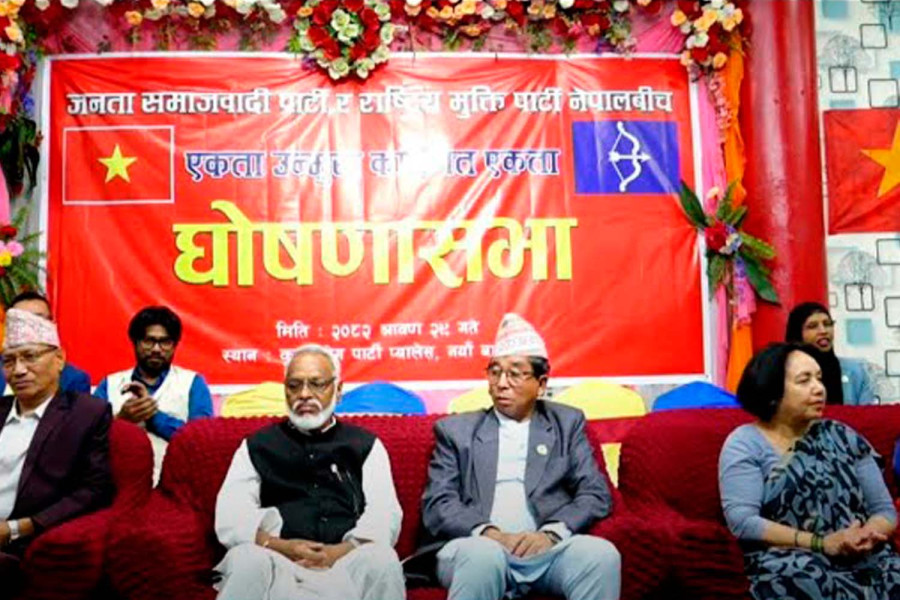Politics
Madhesh-based parties’ Front faces setback within months of formation after Rai-Mahato deal
Ashok Rai and Rajendra Mahato forged a working alliance while the newly formed Federal Democratic Front fails to gather momentum.
Purushottam Poudel
As new forces gain ground in Nepal’s political landscape, Madhesh-based regional parties remain caught in their familiar cycle of splits and alliances.
Most recently, Ashok Rai’s Janata Samajbadi Party and Rajendra Mahato’s Rastriya Mukti Party forged a “unity-oriented working alliance”, which observers view as a fracture in the Federal Democratic Front formed in April.
The Rai-led JSP was formed after splitting from the Upendra Yadav-led Janata Samajbadi Party Nepal (JSP-N) in May last year while Rajendra Mahato formed the Rastriya Mukti Party in January after separating from the Loktantrik Samajbadi Party (LSP) led by Mahantha Thakur.
On August 14, Rai and Mahato inked a working alliance amid a programme in Kathmandu.
A party leader said the two parties will pursue what they call a “unity-oriented working alliance” for now, with the possibility of a complete merger soon.
The deal between the two fringe parties also considers incorporating Thakur’s LSP to form a different alliance within the Front.
However, Rastriya Mukti Party leaders claim that Thakur’s party won’t be taken on board anytime soon.
In January, when the Congress-UML ruling coalition considered amending electoral laws to increase the minimum vote percentage needed to secure seats under the proportional representation (PR) system, Madhesh-based parties tried to form a loose alliance to counter a possible raising of the bar to claim seats under the PR category.
However, a rift appeared in the alliance within months. The regional forces, which have seen several unifications and splits in the past decade, made efforts to reunite all the Madhesh-based parties. But some of them have now formed another bloc.
Keshav Jha, general secretary of the Rastriya Mukti Party, argued that they formed the working alliance aiming for unification between the two parties in the near future. It is not a sub-alliance under the main alliance called Federal Democratic Front.
But not all buy this argument.
A Madhesh observer claimed that earlier the southern neighbour, India, had brought the Madhesh-based political parties together to collectively challenge the present coalition of the Nepali Congress and the CPN-UML.
He claimed that despite India’s efforts, the Front was ineffective to trigger any changes in national politics.
Tula Narayan Shah, a political analyst, claimed that two of the constituents of the Front—the Yadav-led JSP-Nepal and the CK Raut-led Janamat Party—have strong holds in Madhesh politics. Shah said that when both these parties didn’t actively work to make the alliance effective, it turned dysfunctional.
But Hridayesh Tripathi, the leader of the Janata Pragatisheel Party, claimed that they already organised events in three different places across the country, and that they are going to organise programmes in Birgunj, Janakpur, and Biratnagar, among other places within a few days.
Since the Front’s code of conduct allows its member parties to form a working partnership with other parties, the new understanding between Mahato’s Rastriya Mukti Party and Rai’s JSP is not against the spirit, Tripathi said.
“Since the case challenging the formation of the Rai-led party is sub judice in court, they were not part of the Front. It is good that Mahato’s party has made a working alliance partnership with them,” Tripathi added.
Tripathi argued that the Front’s earlier decision to support the candidate of the Nagarik Unmukti Party (NUP) in the Rupendehi-3 bypoll is an example that the Front is functional.
JSP-Nepal spokesman Manish Kumar Suman also claimed that the Front is intact.
However, the member parties of the Front stood divided when they had to select a common candidate for the Rupendehi-3 by-election scheduled for November 3.
When other members of the Front earlier agreed to support the NUP candidate in Rupandehi-3, Janamat Party, a constituent of the same Front, decided to field its own candidate challenging the Front’s decision.
Later, however, NUP was ruled out of the Rupendehi-3 bypoll race due to a division in the party. Despite securing the backing of six alliance members, the NUP could not complete registration with the Election Commission within the given time.
Last month, Resham Chaudhary removed Ranjita Shrestha as the NUP chairperson through a national gathering and selected his father, Lalbir Chaudhary, as the party chief. However, the EC refused to recognise Lalbir as NUP chairperson.
A national gathering of the NUP removed Shrestha from the party chair, alleging her involvement in a corruption scandal, which forced then-minister Rajkumar Gupta to resign.
Both NUP factions filed separate candidacies for the by-election, but the Election Commission rejected their applications raising the legitimacy question.




 19.12°C Kathmandu
19.12°C Kathmandu















